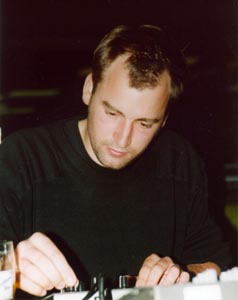![[Metroactive Music]](/music/gifs/music468.gif)
[ Music Index | San Jose | Metroactive Central | Archives ]
Martian Music Box
On 'A Choir of Empty Beds,' B. Fleischmann weds old-fashioned melody and harmony to cutting-edge electronica
By Michelle Goldberg
ORDINARILY, THE WORDS "German experimental minimalist techno" don't set my heart racing. The designation suggests something absurdly frigid and sprocketlike, music that, at most, you can appreciate but never love.
But B. Fleischmann's exquisite A Choir of Empty Beds (Fuzzy Box) challenges that perception. It's like a snowflake, with an icy geometry forming patterns that are anything but cold. It is, in fact, one of the loveliest purely electronic records I've ever heard, one that conjures up all kinds of pathos from a spare palette of machine sound.
Fleischmann's first American release stands out in large part because--despite its fuzzy textures, competing tempos and vibrating, occasionally agitated sound effects--it quietly revels in old-fashioned melody and harmony.
These two things are often egregiously absent from electronic music, especially the cutting-edge kind. The experiments of would-be avant-garde knob tweakers sometimes come across as inquiries into audiences' capacity for enduring grating dissonance and sonic chaos.
In the current musical climate, counterintuitive juxtapositions and vaguely inharmonious polyrhythms are often celebrated. Frustrated with old forms and high on theory, far-out artists like DJ Spooky, Squarepusher, Panacea and Datach'i enjoy testing the boundaries of what music is, journeying beyond the banal stuff of pop. After all, some of the electronic-music cognoscenti scorn trance stars like Paul Oakenfold and Paul Van Dyk precisely because they embrace crowd-pleasing melodies and anthemic builds.
So adamantly refusing to give in to the primal pleasures of melody smacks of puritanism. Although, with their delirious sampledelia and mix of highbrow and lowbrow references, artists like Spooky seem to embrace an ideology that collapses the distinction between pop and art, their music itself reaffirms the difference. Their work requires head-scratching concentration before it provides its little satisfactions. Inherent in such a style, I think, is the suggestion that music that yields its joys too easily somehow lacks virtue.
OBVIOUSLY, this doesn't mean that there isn't great merit in some music that's not easily digested, or that sounds should be judged solely by how easy they are on the ears--Britney Spears is clearly no artistic paragon.
But it can be hard to understand the point of devising ever more radical sonic permutations at the expense of aesthetics. Think of the great experimenters of pop music past: the Velvet Underground, Can, Georgio Moroder, Brian Eno. All couched their new ideas in lovely tunes, beauty and novelty going hand in hand.
A Choir of Empty Beds follows in this tradition and seems all the smarter for it. After all, there's no great trick to creating gnashing percussive maelstroms. What's much harder is to combine wildly diverse rhythmic patterns and alien sounds in a way that sounds as natural and inevitable as a standard 4/4 beat.
The stunning thing about A Choir of Empty Beds is the way all the disparate noises work together. In most hands, the puddle drops, hollow pings and pulses of "Sono" would come off as pretentious noodling, but Fleischmann magically turns them into a symphony of lonely spaces, like decaying old houses falling apart in harmony (the album's title proves amazingly apt).
Similarly, taken separately, one wouldn't expect the elements of "Buzz" to add up to anything but anarchy--a skittering breakbeat, a clanging like old pipes, a muted, metallic synthesizer melody and ghostly countermelody. But everything Fleischmann does seems precisely thought out, and all the parts of "Buzz" fuse elegantly, resulting in an almost choral clarity.
You don't need to have studied Stockhausen or to have read Luigi Russolo's Futurist manifesto The Art of Noises to appreciate "Buzz"--its bliss is right on the surface, sparkling and accessible.
Although hard to believe, the 16-plus minutes of loops, pulses, synthetic strings and modem sounds that make up the last track, sweetly called "Good Bye," develop largely as a halcyon idyll, only occasionally collapsing into black holes. The melody is subtly triumphant, redolent of exhausted early-morning epiphanies. The percussion twitters around it, like raindrops on aluminum and robotic crickets.
The discordant notes, layers of static and brief moments of ugliness only work to keep the sweetness of the tune from turning cloying. There are also moments when "Good Bye" almost fades out entirely--toward the end, it even goes silent for almost two minutes, and one thinks the number has ended. But leave the album on and a gentle jazz saxophone reiterates the melody like a bittersweet encore. "Good Bye" is music to get lost in.
You can hear Eno's influence in Fleischmann's work, as well as touches of Stereolab, the Orb and Vangelis, but really, it resembles nothing else out there--like some kind of Martian music box.
A true sonic pioneer, Fleischmann is moving music forward. But he's not just interested in newness or strangeness for its own sake. Instead, with A Choir of Empty Beds, he embraces innovation in the service of the sublime.
[ San Jose | Metroactive Central | Archives ]
![]()
 Sonic Pioneer: B. Fleischmann creates radical sonic permutations in his groundbreaking work.
Sonic Pioneer: B. Fleischmann creates radical sonic permutations in his groundbreaking work.
From the August 24-30. 2000 issue of Metro, Silicon Valley's Weekly Newspaper.